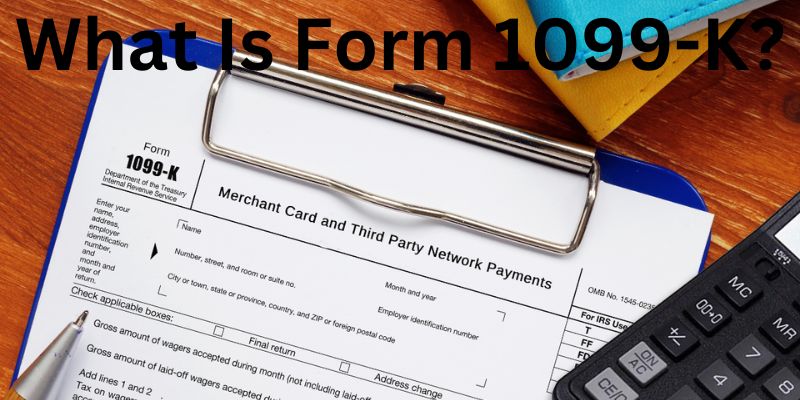What is Form 1099-K?
Susan Kelly
Dec 26, 2023
If you're a business owner or entrepreneur, you may be familiar with the Form 1099-K. But if you're starting, it can seem not very safe. What is Form 1099-K, and why do I need to know about it? This blog post'll explore what this tax form is all about and how it affects your taxes.
Whether you've recently started a small business or are simply interested in learning more about filing taxes correctly, this guide will provide an informative overview of the form's purpose and how to file it accurately.
What Is Form 1099-K? How is it used for businesses?

Form 1099-K is an Internal Revenue Service (IRS) form that reports income from third-party payment networks. This includes payments made with credit cards, debit cards, and other electronic methods such as Apple Pay or PayPal. Form 1099-K is sent to the IRS and you, the payee/recipient of the income, by January 31st of each year.
Form 1099-K also serves as a valuable tool for businesses when preparing their books at the end of the tax year or filing quarterly estimated payments. Providing this information on their business income helps ensure accurate accounting and bookkeeping records that reflect all gross payments received from third-party payment networks.
Form 1099-K helps businesses track growth over time by showing month-over-month increases in total payments and merchant category codes.
Who Needs to File Form 1099-K, and When is the Deadline for Filing

Form 1099-K must be filed if the business has received over $20,000 in gross payments from third-party payment networks and 200 or more total transactions. This includes payments made with credit cards, debit cards, and other electronic methods such as Apple Pay and PayPal. The filing deadline for Form 1099-K is January 31st each year.
If your business fits these criteria, you must file this form with the IRS by the filing deadline. You must provide a copy of Form 1099-K to all payees in the report. Failing to file correctly or missing the filing deadline can lead to penalties or fines from the IRS.
Filing Form 1099-K can be a complicated process for many business owners. Fortunately, several services and software solutions make filing taxes much easier. These include online options such as TurboTax or H&R Block, which can guide you through completing all necessary forms correctly and on time.
Some third-party payment networks also offer reporting tools for businesses to file Form 1099-K quickly and accurately.
What Information is Required on Form 1099-K
Form 1099-K requires a few information about each payment you received from third-party payment networks. This includes:
• Total amount of payments
• Merchant category code (MCC) associated with the payment
• Payment card networks, such as Visa or Mastercard
• Taxpayer identification number (TIN) of the payee
• Type of third-party network used to process payments (e.g., PayPal)
You must provide your business name, address, and other identifying information, such as your employer identification number (EIN). It is important to ensure that all information on Form 1099-K is accurate so that the IRS does not reject it.
By filing Form 1099-K correctly, businesses can accurately track their income and expenses for tax purposes. This form can also help merchants identify any potential fraud or payment discrepancies received from third-party networks. It provides the IRS with important information about a business's gross receipts from credit cards, debit cards, and other electronic payment methods.
How to Correctly Fill out the Form to Ensure Accurate Reporting of Income
Filling out Form 1099-K correctly is essential for accurate and timely income reporting to the IRS. Here are some tips to ensure that you fill out this form correctly:
• Ensure all information on the form is correct and up-to-date. This includes business name, address, employer identification number (EIN), taxpayer identification number (TIN), merchant category code (MCC) associated with each payment, total amount of payments, and type of third-party network used to process payments.
• Double-check each entry before submitting the form. Ensure all amounts are accurate and no fields are left blank or incorrectly filled in. If any mistakes are made, it can lead to fines from the IRS.
• Use reliable software or service to help you complete the form correctly. Various online options, such as TurboTax or H&R Block, can guide you through completing all necessary forms and provide helpful tips for accurate filing. Some third-party payment networks also offer reporting tools for businesses to file Form 1099-K quickly and accurately.
• File Form 1099-K by the deadline of January 31st each year. Failing to do so may result in penalties from the IRS.
By following these tips, you can be sure your business will accurately report its income on Form 1099-K and avoid any potential fines or penalties from the IRS. With the proper filing of taxes, businesses can focus on running their operations more efficiently and growing their profits.
Common Mistakes to Avoid when Filing Your Taxes with a Form 1099-K
Filing taxes can be tricky, especially when dealing with Form 1099-K. Failing to file correctly or missing the filing deadline can lead to penalties or fines from the IRS. Here are some common mistakes you should avoid when filing your taxes with a Form 1099-K:
• Incorrect information: Make sure that all the information on the form is correct and up-to-date, including business name, address, employer identification number (EIN), taxpayer identification number (TIN), merchant category code (MCC), total amount of payments, and type of third-party network used to process payments. Double-check each entry before submitting the form.
• Forgetting to File: Don't forget to file Form 1099-K by the deadline of January 31st each year. Failing to do so may result in penalties from the IRS.
• Using unreliable services or software: Use reliable software or service to help you complete the form correctly. Various online options, such as TurboTax or H&R Block, can guide you through completing all necessary forms and provide helpful tips for accurate filing. Some third-party payment networks offer reporting tools for businesses to file Form 1099-K quickly and accurately.
By avoiding these common mistakes, you can ensure that your business accurately reports its income on Form 1099-K and avoid any potential fines or penalties from the IRS. With the proper filing of taxes, businesses can focus on running their operations more efficiently and growing their profits.
FAQS
How do I get my 1099-K from PayPal?
You can download your 1099-K from PayPal by signing into your account and navigating to the "Tax Documents" tab. You will find a link to access the document or print it out for filing.
Is 1099-K the same as K1?
No, the 1099-K and K-1 forms are different. Form 1099-K reports income received from third-party payment networks, while Form K-1 reports a partner's share of income, losses, deductions, and credits from a business partnership.
What is Form 1099 Div?
Form 1099-DIV reports dividends and other distributions from investments such as stocks, bonds, and mutual funds.
Conclusion
Knowing what form 1099-K is and all the details, regulations, and associated filing requirements are essential for compliance with the IRS. Ultimately, properly filing Form 1099-K falls on the business or merchant. Filing correctly keeps your business in good standing with the IRS and helps ensure you have all the necessary information to stay informed and accurately report your taxes yearly. If you need more certainty about filing your 1099-K form, contact a knowledgeable tax professional who can assist.







